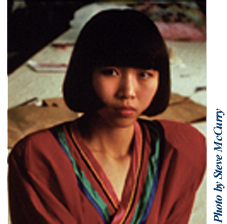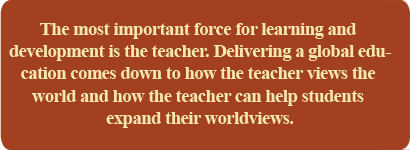

Charting a Course for World Citizenship
continuedCommon Critiques
The concept of world citizenship has many critics who claim we cannot overcome our local prejudices and national bonds. Others believe that citizenship doesn’t make sense without a government, and many contend that the notion is too vague or even too dull.

It’s true we will always have special relationships with those closest to us, but world citizenship can co-exist with other levels of attachments, in much the same way that we are proud members of our particular states, while also relishing our national identity.
While there is no such thing as a world governing body (and we shouldn’t hope for that), there does exist an international body of standards and regulations (in areas including trade and the environment), along with a developing global civil society that provides citizens numerous opportunities for expression and action.
Finally, as we cross borders and develop relationships, as we foster cooperation and collectively answer global challenges, we will improve the lives of millions, and the notion of world citizenship will come to life in meaningful and passionate ways.
Hurdles Ahead
The road toward world citizenship, though, features some major hurdles. Unfortunately, educational institutions and the media, which heavily shape our viewpoints, often operate solely in a national context.
Educational institutions were created in part to build a sense of national identity and national community. However, today they must balance that emphasis with the goal to prepare students who can connect with people from different cultures to overcome international crises.
This is not just a humanitarian imperative. Business leaders tell us that the next generation of professionals must be able to work in diverse environments throughout the world. We should not and we cannot overlook the professional demands that require a global education. Yet, most educational institutions have been slow to adapt to our globalized world.
The media similarly remain limited in scope and vision, often confining the spectrum of viewpoints to that of U.S. officials and rarely reporting from overseas. In fact, coverage of international news in both newspapers and major broadcast news programs has fallen sharply over the years.
The Power of Education
Schools can take many paths to prepare world citizens. Learning another language provides an important gateway to other cultures, and foreign-language programs need to be expanded.

The Internet has widely democratized knowledge, providing a world of information about different peoples and cultures. It also can facilitate collaborations. As Fairleigh Dickinson has done through the creation of the Global Virtual Faculty™, scholars and practitioners from afar can be invited to offer viewpoints on issues being studied via the Internet. Or, professors can encourage students to link with students in other countries, using e-mail to create a room of electronic pen pals.
While technology can connect the classroom to the world in unique and meaningful ways, there is no substitute for living and learning within another culture. The impact of study abroad on students is powerful. Study after study has shown that students not only learn to understand, appreciate and adapt to other cultures, they learn more about themselves.

But because few Americans study abroad, having international students enrich our local environment is vitally important. We need to learn from them. We need to hear their voices and understand their perspectives.
The most important force for learning and development is the teacher. Delivering a global education comes down to how the teacher views the world and how the teacher can help students expand their worldviews. Simple means, like the use of role playing, can introduce different perspectives. There is no shortage of opportunities to cultivate global understanding.

The Power of the Individual
Outside of the classroom, friends and family members serve as critical role models. Take a strong interest in different cultures and world issues. Help children look through the eyes of others and continually show them how to translate values into action.
Always search for multiple perspectives. Use the power of your voice to demand the media better cover our world and to demand that teachers and schools incorporate global lessons.
The opportunities for world citizens to act beyond borders have never been greater. The forces that have made possible the creation of a global economy also enable citizens to communicate across oceans instantaneously and forge networks of compassion committed to making a difference.
Look, for example, at the work of the International Campaign to Ban Landmines (ICBL). Just five years after its formation, it was responsible for an international treaty prohibiting the use of antipersonnel landmines. The ICBL and groups like it have been heralded for their use of technology, particularly the Internet, to build awareness and mobilize activists.
Acting beyond the realm of states, citizens can influence governments, shape market realities and help determine global labor and environmental standards.
Anyone can get involved in local or global projects that deliver meals to the elderly in the neighborhood, expand township recycling programs, clear landmines in Cambodia and Mozambique, bring life-saving vaccines and medicines to children and the sick in Indonesia and India, or provide educational opportunities for girls and women in Jordan and Bolivia. We can also lobby our governments to adopt policies that benefit people down the block and around the globe. The possibilities are only limited by your imagination.
We may not be able to predict the future, but we can create it.
FDU Magazine Home | Table of Contents | FDU Home | Alumni Home | Comments
©Copyright 2006 Fairleigh Dickinson University. All rights reserved.
For a print copy of FDU Magazine, featuring this and other stories, contact Rebecca Maxon, editor,
201-692-7024 or maxon@fdu.edu.